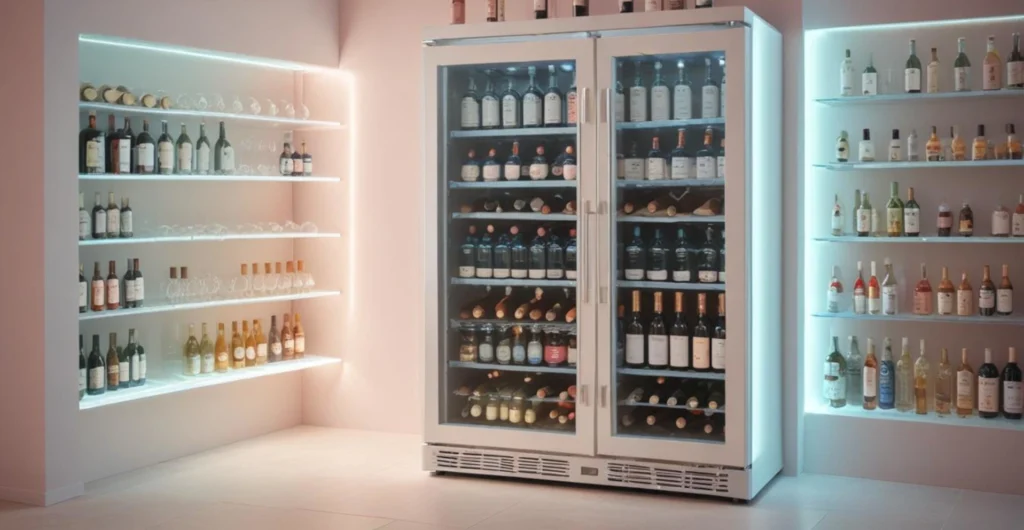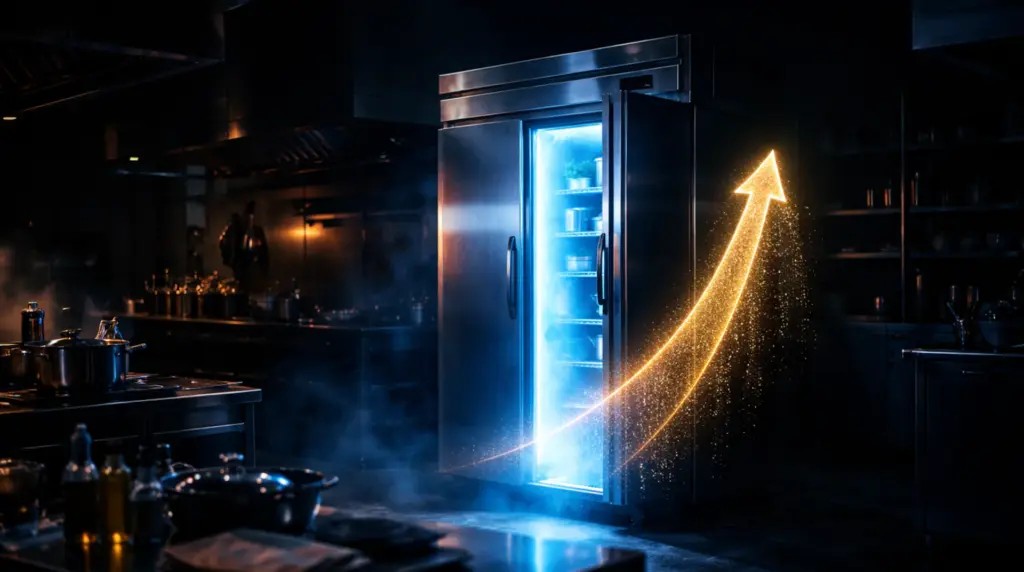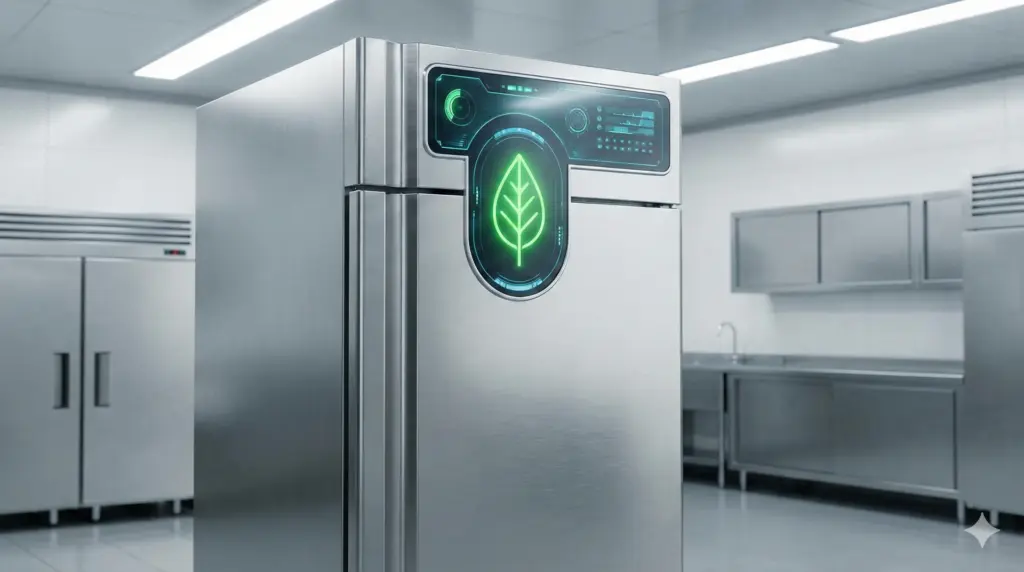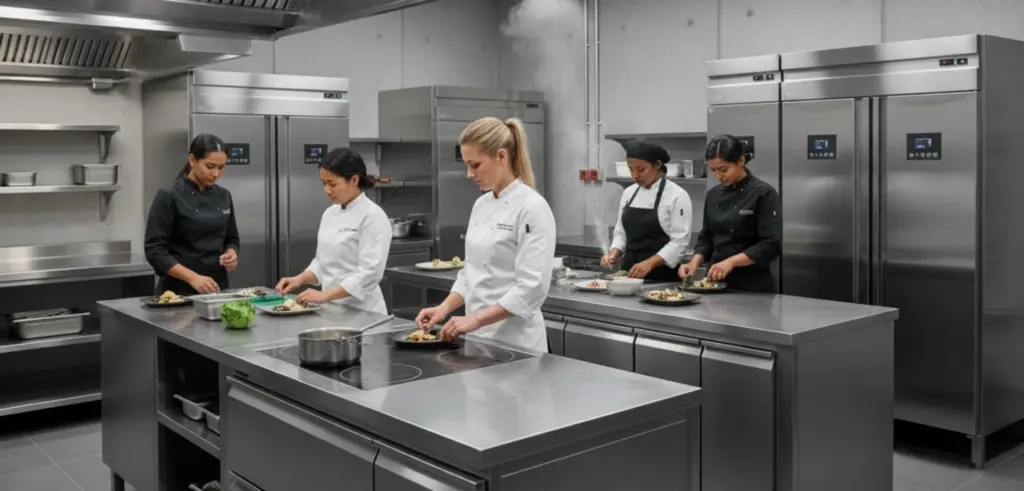When it comes to medium and high-end wines, keeping the bottles in the optimal environment of refrigerated cellars guarantees a controlled and specialised environment, preserving their unique characteristics and allowing them to evolve properly.
It should not be overlooked that refrigerated wine cellars offer a better organisation and presentation of the wine collection, which is especially beneficial for restaurants and gourmet shops, improving the perception of quality and exclusivity by customers and diners.
The first tips
At Coreco GourmetWe understand that proper wine storage is essential to preserve the quality of wine and to enjoy all its characteristics. However, we often make the mistake of storing bottles in refrigerated wine racks at the bar or in the fridge at home, which is not the ideal environment for preserving wine.
Although for frequent racking or dispensing by the glass it may seem that this equipment is sufficient, in reality it is not designed to keep the wine in optimal conditions, whether in closed or open bottles.
Knowing the correct storage conditions is important not only to preserve premium wines, but also to ensure that even the most affordable options maintain their quality. In this article, we will explore why bar wine racks and domestic refrigerators do not meet the requirements for wine preservation and what is the best alternative.
Interested in finding the ideal solution to preserve your wines? Contact with our team of experts at Coreco Gourmet to receive personalised advice and discover the refrigerated wine cellars that meet the needs of the market.
1. Why are bottle racks not suitable for wine storage?
The refrigerated wine racks under the bar are designed to keep bottles at a pleasant temperature for immediate consumption. However, these racks are not an option for prolonged wine storage due to several factors..:
Purpose of the bottle rack
A bar wine rack is designed to keep beverages accessible and ready for service, especially in premises with high bottle turnover. This implies that this equipment is optimised for quick accessibility and not for prolonged storage of wines. In addition, the temperature in these racks is often not calibrated with the precision that wine needs to be kept properly.
Impact of constant transferring and vibrations
Frequent movement and vibrations of the doors and compressor adversely affect the wine. By constantly opening and closing the bottle rack doors, the wine is exposed to temperature fluctuations and micro-vibrations that alter the structure of the wine and accelerate its deterioration. The wine's aromatic and volatile compounds are sensitive to these factors, resulting in a loss of taste and quality over time.
Temperature and humidity problems in bar racks
Bar wine racks usually operate at temperatures ranging from 8°C to 12°C, ideal for serving white wines, but unsuitable for long-term storage. Moreover, humidity is not a controlled factor in these racks, which causes the corks to dry out and air to enter the bottle, favouring the oxidation of the wine.
Do you want your customers to enjoy wine at its highest quality? Discover how a specialised refrigerated wine cellar is the best option for keeping bottles in perfect condition. See wine cellars at Coreco Gourmet
2. Why is the home refrigerator not an option for storing wine?
Storing wine in the home refrigerator is a common practice, but it can be detrimental to the quality of the wine. Although it may seem a convenient alternative, the environment of a domestic refrigerator does not meet the necessary preservation requirements.
Vibrations and their impact on wine
The refrigerator emits constant vibrations due to its motor and compressor, which can damage the wine at the molecular level. The vibrations agitate the natural sediments and compounds in the wine, causing an alteration of its structure and eventually affecting its sensory characteristics. In fine wines, these alterations can be irreversible.
Inadequate temperature and humidity
Home refrigerators usually have low temperatures, between 1°C and 4°C, designed to preserve perishable foods, not wine. At such low temperatures, wine loses its aromas and its taste becomes flat.
In addition, the humidity in domestic refrigerators is not suitable for corks, which dries them out and allows air to enter, accelerating the oxidation process.
Odour pollution
The domestic refrigerator houses a wide variety of foods with strong aromas, such as cheeses, vegetables and meats. These odours can seep through the cork or cap of wine bottles, affecting their aroma and taste. Over time, wine stored in a home refrigerator can acquire undesirable flavours.
Refrigerated wine cellars: Effective preservation
The conservation of wine in a refrigerated cellar The specialised refrigeration system is considerably more effective than in a bar bottle rack or domestic refrigerator, due to factors such as temperature stability, humidity control and the absence of vibration.
According to conservation experts, the constant temperature on 10°C and 14°C and a relative humidity between 60% and 70% are key to preserving the flavours and aromas of the wine. On the other hand, in a bar wine rack or refrigerator, where temperatures tend to fluctuate, these parameters are not met, affecting the quality of the wine.
Studies and conservation guidelines for sites such as Wine Spectator y Wine Folly mention that exposure to vibrations and temperature fluctuations shortens the shelf life of wine. For example, the stable conditions in a wine cellar allow a wine to be kept in optimal conditions for several years, whereas in a domestic refrigerator, its quality is compromised in a matter of weeks or even days for more delicate wines.
3. What happens to open wine in these environments?
Once opened, a bottle of wine is even more sensitive to temperature changes and oxidation, as it is in direct contact with oxygen. Storing an opened bottle in a bar wine rack or in a domestic refrigerator can quickly deteriorate its quality.
Accelerated oxidation
When open, the wine is exposed to more oxygen, which accelerates the oxidation process. In a bar wine rack or domestic refrigerator, where the temperature and humidity are not ideal, oxidation occurs even faster, ruining the wine's flavour and aromas.
Loss of flavour and aroma
Wine opened in an unsuitable environment loses its freshness and aromatic nuances. Both the bar wine rack and the domestic refrigerator do not have the precise control that an open bottle needs to maintain its sensory profile, resulting in a wine that is less appealing to the palate.
4. Conservation factors required for the preservation of wine
To understand why a bar wine rack or a domestic refrigerator is not suitable for storing wine, it is important to remember what optimal conditions wine needs:
- Constant and precise temperatureIdeally between 10°C and 14°C, depending on the type of wine.
- Controlled humidityBetween 60% and 70% to prevent the cork from drying out and to maintain its watertightness.
- Vibration-free environmentVibrations damage the structure of the wine and its aromatic compounds.
- Protection from external odoursTo avoid contamination of undesirable aromas and flavours.
A bar wine rack or a home refrigerator cannot offer these conditions, which results in a suboptimal preservation of the wine.
5. Recommended solutions for storing wine correctly
The ideal solution for storing wine, whether open or closed, is a specific refrigerated wine cellar. These cellars are designed to control all of the above factors and ensure that each bottle maintains its characteristics intact.
Benefits of refrigerated wine cellars:
- Precise temperature controlThe wine cellars allow you to select the ideal temperature for each type of wine, from whites to reds and sparkling wines.
- Regulated humidityThey keep the humidity in the ideal range to preserve the cork and prevent oxidation.
- Vibration-free environmentEquipped with anti-vibration systems that protect the molecular structure of the wine.
- Prevent odour pollutionThe cellars are designed exclusively for wine, which prevents external odours from interfering with the taste of the wine.
To preserve an opened bottle, a vacuum system can be used and the bottle can be stored in a refrigerated cellar, extending its shelf life and maintaining its quality.
Looking for the best way to preserve your wines? Discover our refrigerated wine cellars at Coreco Gourmetdesigned to keep the wine in ideal conditions.
See more here
At Coreco we know how to take care of our wines
To learn more about the proper use of refrigerated wine coolers in gourmet spaces, the Coreco blog offers complementary articles that can be very useful.
For example, the Guide to the use of wine cellars in restaurants and gourmet shops provides practical recommendations for storing and serving wine in these establishments, which helps to improve the customer experience and maintain consistency in wine quality.
In addition, the article Wine preservation in refrigerated cellars delves into the ideal storage conditions and the benefits of using specific equipment for wine storage. These articles are excellent resources for those interested in maximising the investment in their wine collection and ensuring that each bottle is preserved to its full potential.
6. Without a refrigerated cellar, a good wine goes to waste
Although it may seem convenient to store wine in a bar wine rack or domestic refrigerator, this practice compromises the quality of the product and affects its taste and aroma over time.
Investing in a dedicated refrigerated wine cellar not only protects the investment made in the wine, but also ensures an optimal tasting experience for each bottle. Both restaurants and end consumers will benefit from wine kept in the right conditions.
Coreco: experience in constant evolution
Coreco, with its solid experience in the industrial refrigeration for the Horeca sectorhas become a benchmark in specialised solutions for the preservation of food and beverages. Its range of refrigerated coolers is designed with the needs of professionals and the importance of preserving high quality products in optimum conditions in mind. Investment in research and advanced technology allows Coreco to offer refrigeration solutions adapted to the most demanding standards, making it a reliable choice for the gastronomy sector.
With a focus on efficiency, sustainability and precision, Coreco Gourmet specialises in offering equipment that not only meets the necessary technical requirements, but also adds value in terms of durability and performance.
This industry authority assures users of Coreco refrigerated wine coolers that they are purchasing a product backed by years of professional experience and testing.











